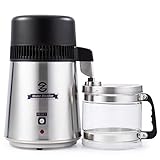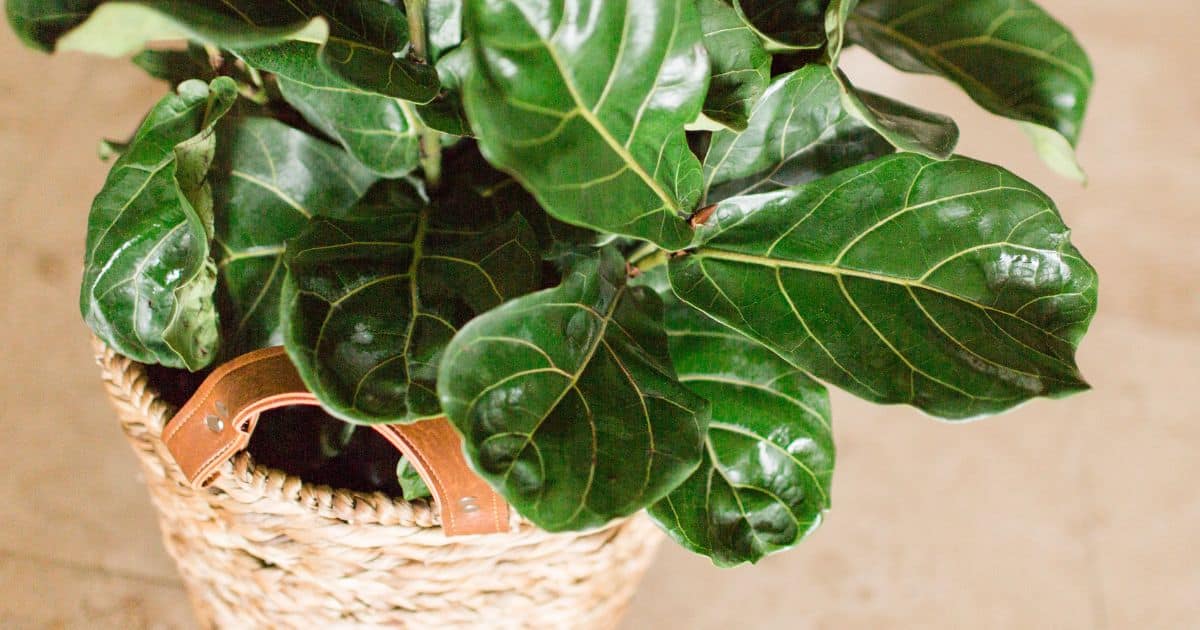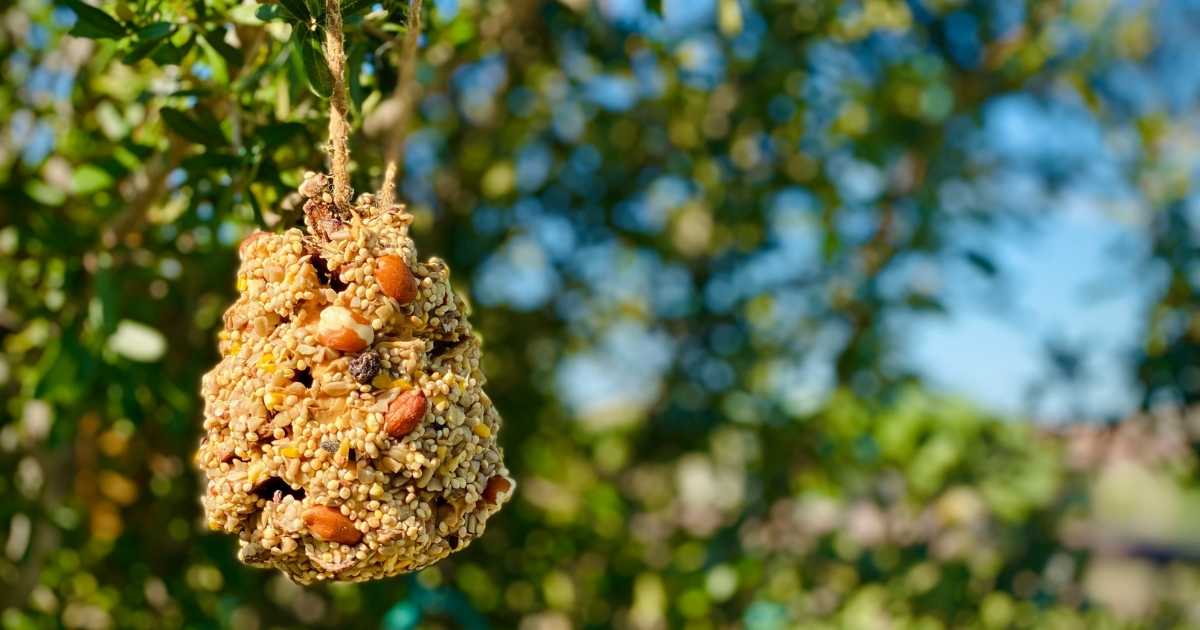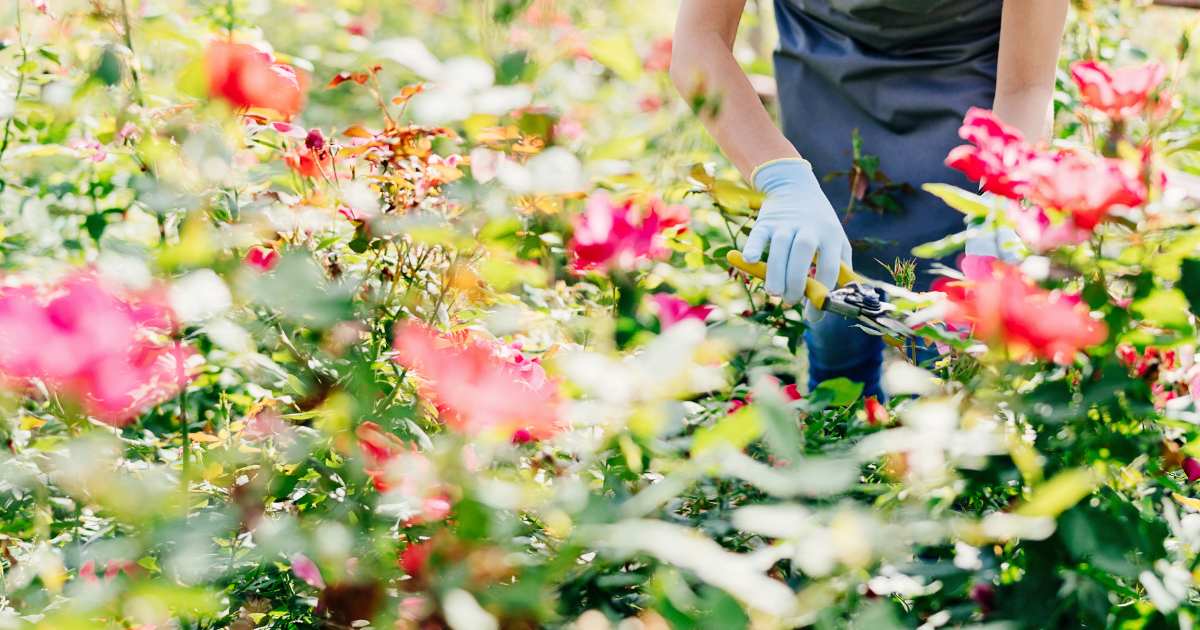Watering Plants: Best Water + Watering Tips for Houseplants
Wondering what the best water is for your houseplants? Great!
In this article, the best water for plants, I’m spilling the tea on the different types of water and the best water to use for the overall health of your indoor plants.
As a proud plant mama of over 40 plant babies, I’ve learned a thing or two about caring for houseplants. Including what the best water is for plants.
I will go over the benefits and disadvantages of tap water, soft water, spring water, bottled filtered, distilled water, rainwater, and even aquarium water!
This post may contain affiliate links. Click to visit policies and disclosures
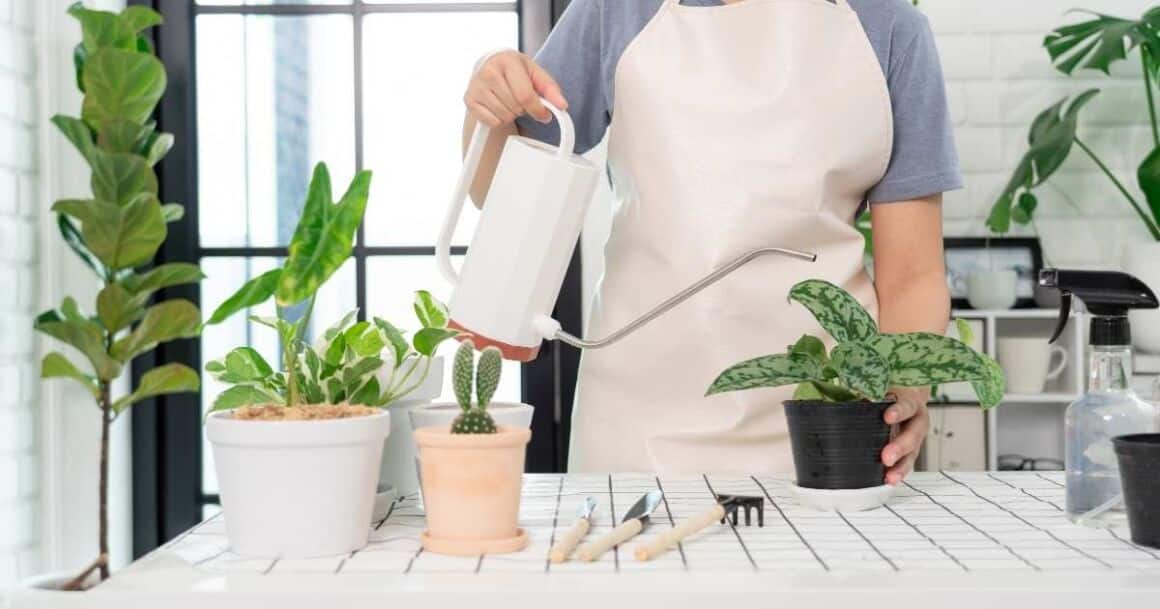
The Best Water for Plants: The Different Types of Water
Tap Water for Houseplants
What is Tap Water? (tap water explained)
Tap water (also known as faucet water, running water, or municipal water) is water supplied through the tap.
Tap water quality varies depending on your location.
Benefits of watering plants with tap water: If tap water is all you have available to water your houseplants, water away. Unless you have a water softener, that is.
Unsoftened Tap water is OK but not great.
Most houseplants can tolerate tap water, but it could harm to sensitive plants such as spider plants.
Spider plants are very sensitive to chlorine and other chemicals, such as fluoride, which can turn the tips of the leaves brown and cause brown spots on even hardy plants like pothos or snake plants.
Disadvantages of water plants with tap water: Tap water contains chemicals like chlorine, fluoride, and various metals that can hamper plant growth.
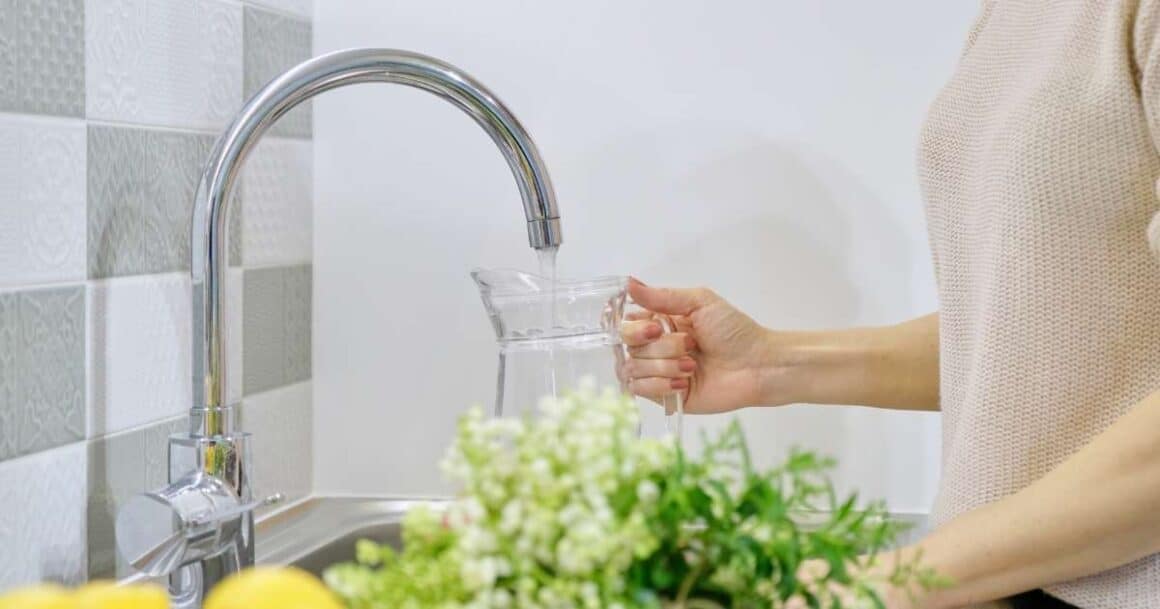
If Tap Water is all you have
If tap water is the only water available for watering houseplants, it’s a good idea to let water sit for at least 24 hours before watering.
You may also want to consider purchasing a home filtration system or a water distilling machine to use for your houseplants’ drinking water.
Softened Water for Houseplants
What is softened water?
A water softener may be installed if you live in a hard water area.
Water softening removes calcium, magnesium, and other metals in hard water.
Soft water is not the best choice for watering houseplants because most water softeners use sodium chloride.
Sodium chloride can cause a build-up of sodium ions on the soil surface, which will cause plant growth problems.
The problem with softened water for plants:
Most houseplants hate high salt levels, so don’t water your plants with water that has run through a water softener.
Consider using rainwater, filtered water, distilled or bottled water instead.
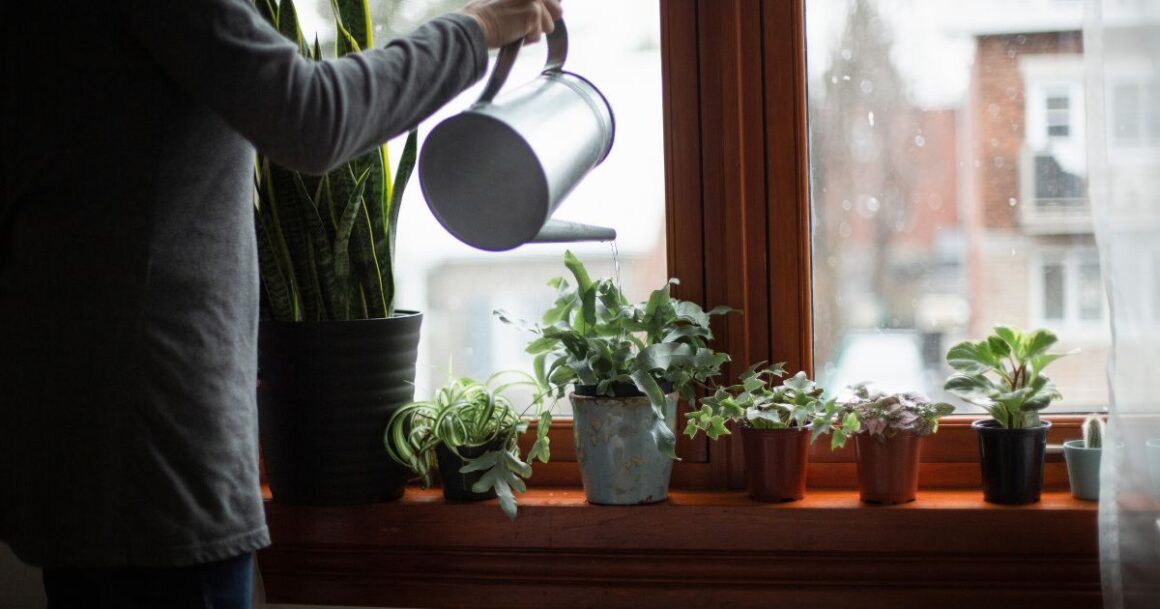
Natural Spring Water for Houseplants
What is Spring Water?
Spring water is a popular form of bottled water. It comes from natural springs or groundwater.
Spring water may have a higher mineral content than water collected from a river or stream.
Spring water is considered pre-purified, as it has traveled through natural filters like limestone, sandstone, and clay.
Spring water meant for human consumption is then tested and filtered. Source
Benefits of watering plants with spring water:
Using spring water on plants provides nutrient-rich minerals such as calcium and magnesium in the pH range between 7.0 and 8.0, which plants love.
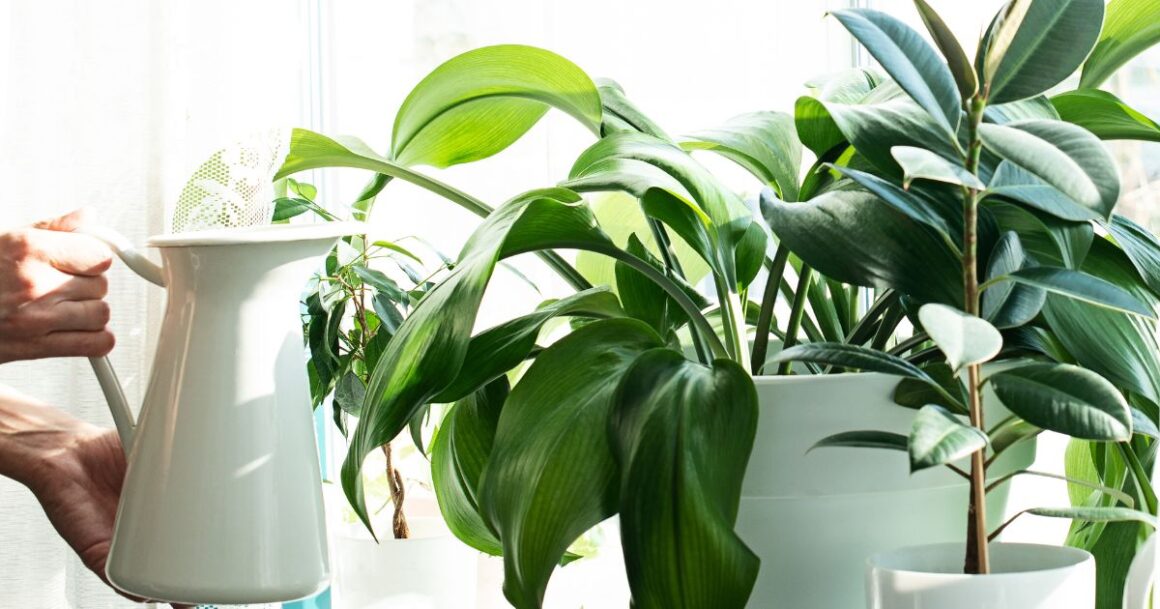
Distilled Water for Plants
What is distilled water?
Distilled water is steam from boiling water that’s been cooled and returned to its liquid state. Some claim that distilled or purified water is the best for human consumption, but what about houseplants?
Distillation rids water of impurities and removes more than 99.9% of the minerals dissolved in water. That means it’s removing even healthy minerals.
Benefits of watering plants with distilled water:
Distilled water is one of the best choices for watering houseplants because it contains no harmful chemicals.
Disadvantages of watering plants with distilled water:
While distilled water may be the best type of water for watering plants, during the distillation process, healthy minerals like magnesium salts that are important for plant growth and the overall health of your plants are removed.
In my experience, long-term use of distilled water can result in stunted growth and discoloration because they aren’t getting the necessary nutrients.
If you want to water your plants with distilled water, make sure you are using a good multi-purpose plant food at least once per month to replace lost minerals.
Did you know you can distill water at home? If you are interested in making your own distilled water at home, this article: How to make distilled water at home will get you well on your way!
You can also buy Home Countertop Distiller Water Machines that make distilling water at home easy!
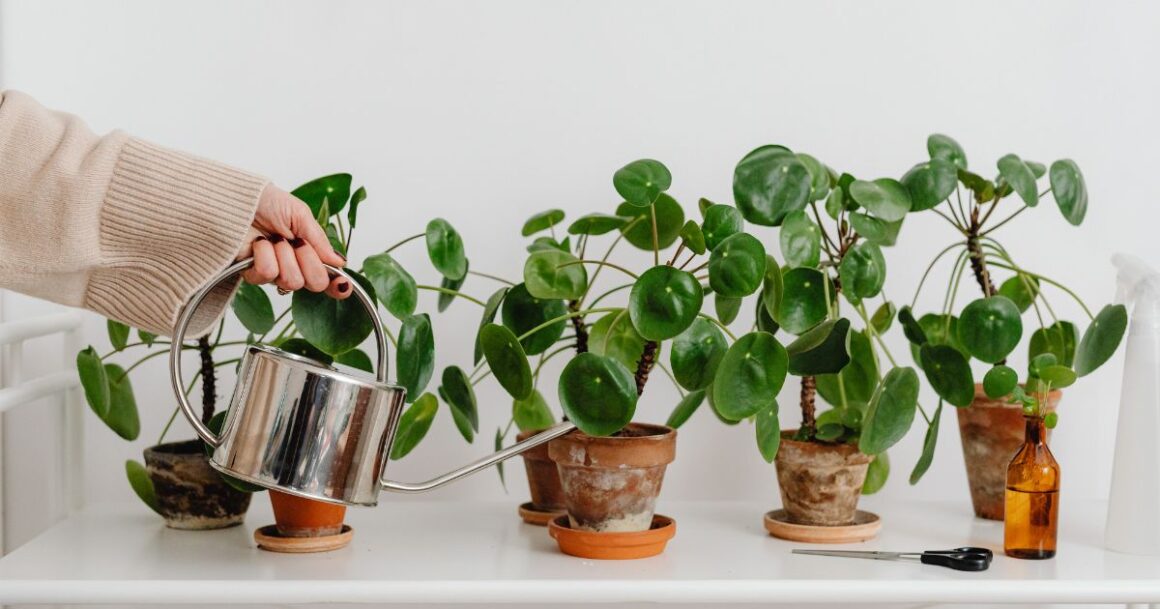
Filtered Water + Bottled Water for Houseplants
What is Filtered Water?
Filtered water or bottled water is sourced from municipal tap water, which is then run through carbon filters or reverse osmosis to remove the chlorine and sometimes a micron filter.
After the filtering, it is ozonated and bottled.
Reverse osmosis is one of the most common filtration systems used to filter water.
Reverse Osmosis Is a highly effective filtration system.
Reverse osmosis removes heavy metals and common chemical contaminants, including sodium, chloride, copper, chromium, and lead;
The reverse osmosis process should also reduce arsenic, fluoride, radium, sulfate, calcium, magnesium, potassium, nitrate, and phosphorous. (Let’s sure hope so, right!)
You can purchase a reverse osmosis system for your home to filter water which is more cost-effective than purchasing bottled water.
There are many home filtration systems available that are easy to install and quite cost-effective.
One of the most commonly known home filters that use an activated carbon filter is the Brita water filter.
Brita-filtered water will remove odors and chemicals like chlorine, lead, asbestos, and benzene from the water.
This makes it safer than directly using water straight from the tap.
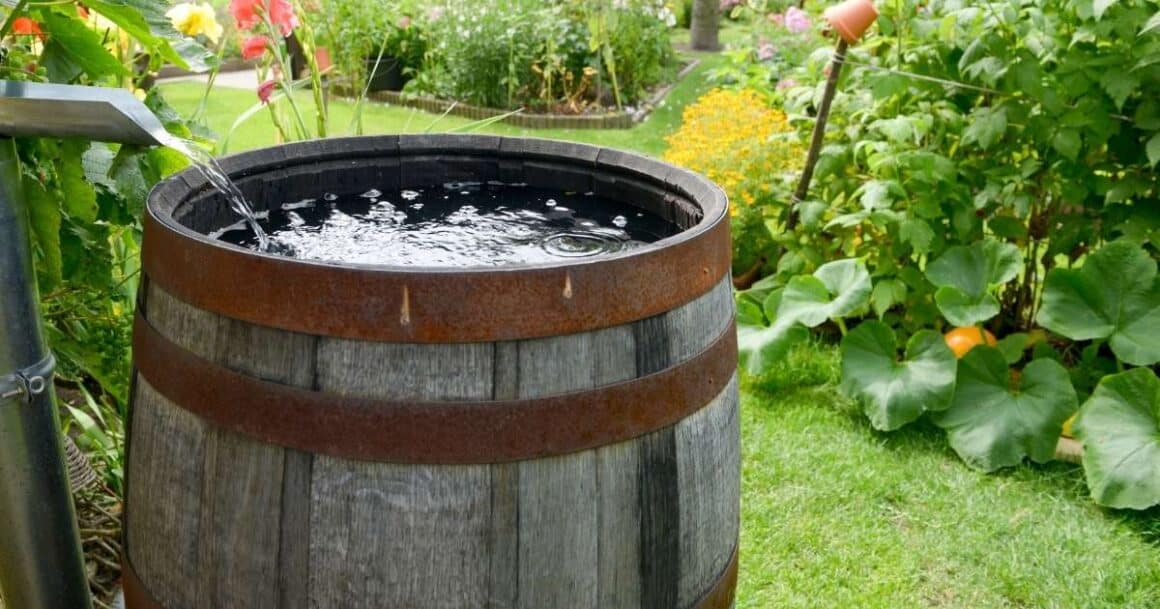
Rainwater or Melted Snow for Houseplants
Rainwater is ultimately the best kind of water for watering plants! While rainwater is the better option, it may not always be available.
To have rainwater on hand, you must catch it and store it when it rains.
The Benefits of Watering Plants with Rainwater
Rainwater is the best bet for watering plants because Rainwater contains nitrate.
Nitrates are a form of nitrogen. Nitrogen makes plants thrive!
The Disadvantages of Watering Plants with Rainwater
In many cases, rainwater is difficult to catch and may not be readily available.
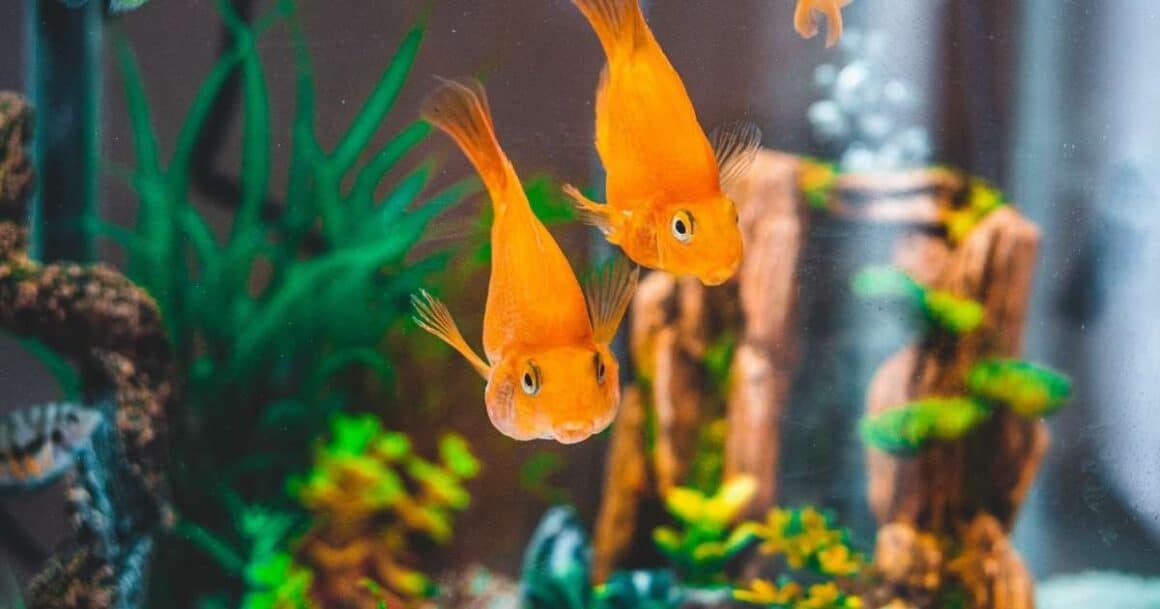
Aquarium Water for Houseplants
Aquarium water or fish tank water is a fantastic choice for watering plants if you have it available.
Aquarium water contains algae growth and is rich in beneficial bacteria, potassium, phosphorus, nitrogen, and trace nutrients that promote lush, healthy plants.
These are the same nutrients you’ll find in many commercial fertilizers.
If you don’t have fish tank water available, I suggest trying this amazing plant fertilizer.
It’s organic, living fertilizer and soil-conditioning humus compost made from fish manure for indoor and outdoor plants.
Plants love it, and it’s odorless! No fishy smell!
FAQ: Watering Plants (+ tips on the best water, etc)
What is the best type of water to use for houseplants?
The best water for most houseplants is room-temperature, filtered, or distilled water. Tap water can be used, but it’s best to let it sit out for 24 hours to allow chlorine to dissipate. Some sensitive plants may react poorly to fluoride or hard water minerals.
How often should I water my houseplants?
It depends on the type of plant, pot size, and environment. A good rule of thumb is to water when the top inch of soil feels dry. Overwatering is one of the most common houseplant mistakes, so always check soil moisture first.
Is tap water bad for houseplants?
Not necessarily. Many houseplants tolerate tap water just fine, but some are sensitive to chemicals like chlorine and fluoride. Letting tap water sit out overnight or using filtered water can reduce potential harm.
Can I use rainwater to water my plants?
Yes! Rainwater is often considered ideal for houseplants because it’s naturally soft and free of salts and chemicals. Just be sure to collect and store it safely.
What are signs I’m overwatering my houseplants?
Signs include yellowing leaves, root rot, a musty smell from the soil, or soggy soil that never dries out. If in doubt, hold off on watering and let the plant dry out a bit.
Should I water my houseplants in the morning or evening?
Morning is usually best. It gives the soil time to absorb moisture and helps prevent fungal issues that can occur if plants stay too damp overnight.
Conclusion: Watering Plants The Best Water for Houseplants
I’ve given you an outline of the best water for plants and the pros and cons of each type of water for plants.
Ultimately the form of water is based on availability, personal preference, and how your houseplants respond.
Your houseplants will let you know if they are unhappy.
Related: How to kill Fungus gnats forever
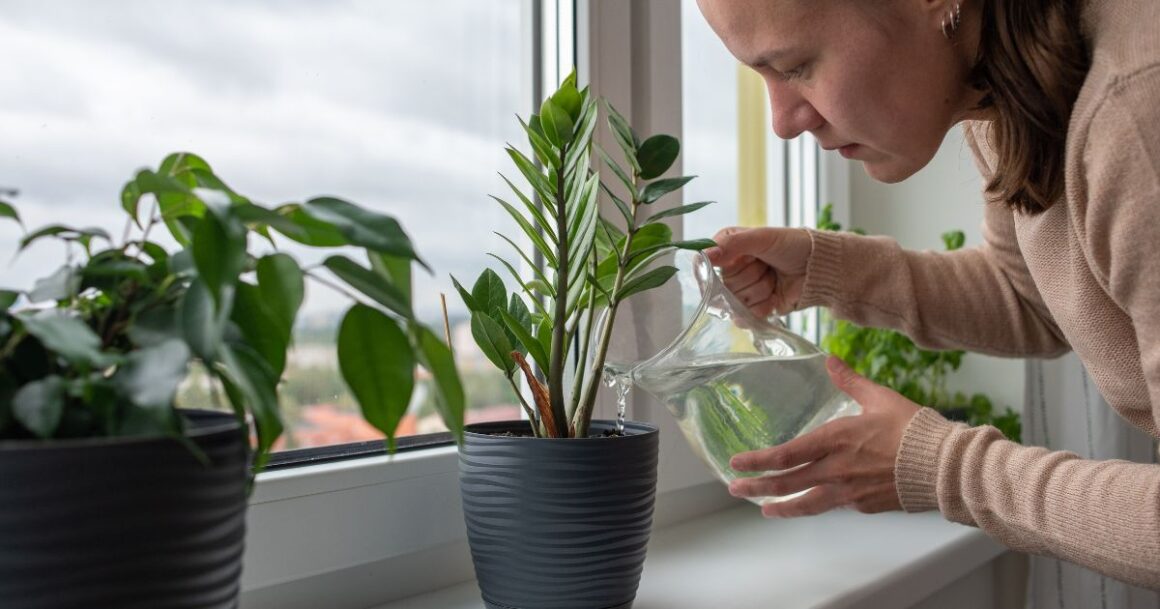
Watering Tips for Houseplants
Choose the best water possible and follow these watering tips for plants:
Get the Temp Right- water temperature impacts dissolved oxygen content, so it’s best to water plants with room temperature water. Warm water or cold water can shock plants.
Watch for signs of problems- Watch for signs of fungal diseases, insects, and overwatering. If you think your plant is un-well-it’s a good idea to use a plant care app to diagnose the problem.
Schedule consistent watering- The best time to water plants is in the morning. Avoiding watering plants during the hottest time of the day whenever possible.
I water once weekly during the summer months and once every two weeks rest of the year. The watering schedule will vary based on the time of the year and on climate.
Be sure not to overwater- Too much water is worse than not enough water. Less water is better than More. Excess water causes soggy soil and even root rot.
Test the water: you can test the ph levels in the water you use if you think your plants are unhappy.
The optimum ph level for houseplants is between 7.0 and 8.0, which plants love.
Provide proper drainage- Make sure your plant’s soil is draining properly. Proper drainage holes on the bottom of the pot. Also, transplant your plant using a good quality potting mix if it’s not draining properly or showing any signs of distress.
More Houseplant Tips:
Different Types of Plants Have Different Needs.
Some plants require more water, some less. Some plants like bright light, while others do well in low-light areas.
Some plants love distilled water, while others prefer filtered or bottled water.
Some Plants are more sensitive than others:
English Ivy
Salts present in ordinary tap water are highly detrimental to English Ivy. The best water for an English Ivy plant is distilled water.
Peace Lily
Peace lilies are sensitive to tap water chemicals, so distilled or rainwater is optimal. Peace lilies love humidity and bright filtered light, although they do ok in lower-light rooms for a season.
African violets
African violets prefer distilled or filtered water that is lukewarm temperature.
Chinese evergreen plants
Chinese evergreen plants are beautiful houseplants but are a tad bit picky. Make sure you water Chinese evergreen plants with distilled water and fertilize them once per month.
Tropical Plants
My tropical plants do best when I water them with bottled/filtered water bought from the store. (I can’t use water from my tap because it’s softened).
Tropical plants love many natural minerals found in water, so distilled water is not the best choice.
My tropical plants quickly show yellow leaves and slow growth when watered with distilled water for long periods of time.
FAQs: The Best Water for Indoor Plants or Houseplants
What is the best type of water for houseplants?
The best type of water for houseplants is typically filtered, distilled, or rainwater.
These options are free from harmful chemicals, salts, and minerals that can accumulate in the soil and affect plant health over time.
Can I use tap water for my houseplants?
Tap water can be used for houseplants, but it depends on the quality of your tap water.
If your tap water is heavily treated with chemicals like chlorine or contains high levels of minerals, it may be detrimental to your plants in the long run.
Consider using filtered tap water or letting tap water sit out for 24 hours to allow chlorine to dissipate before watering your plants.
Is rainwater the best option for watering houseplants?
Yes if you can get your hands on enough. Rainwater is often considered one of the best options for watering houseplants because it’s naturally free of chemicals and minerals.
Can I use leftover tea or coffee to water my houseplants?
Yes, diluted leftover tea or coffee can be used to water some houseplants, as long as it’s not too strong and doesn’t contain additives like sugar or milk.
Tea and coffee contain small amounts of nutrients that can benefit plants, but it’s essential not to overdo it, as too much caffeine can harm them.
Should I use room temperature water or cold water for watering my houseplants?
I think it’s best to use room-temperature water for watering houseplants, as extreme temperatures can shock the the plant.
How often should I water my houseplants?
The frequency of watering depends on various factors such as the type of plant, pot size, soil type, humidity levels, and environmental conditions.
It’s a good idea to check the moisture level of the soil before watering and adjust accordingly. In general, it’s better to underwater than overwater houseplants to prevent root rot.
Can I use water from my dehumidifier for my houseplants?
Water from a dehumidifier can contain minerals and impurities that may not be suitable for all houseplants.
While some plants may tolerate this water, it’s essential to monitor their health and watch for any signs of mineral buildup or damage. If in doubt, it’s safer to use alternative water sources.
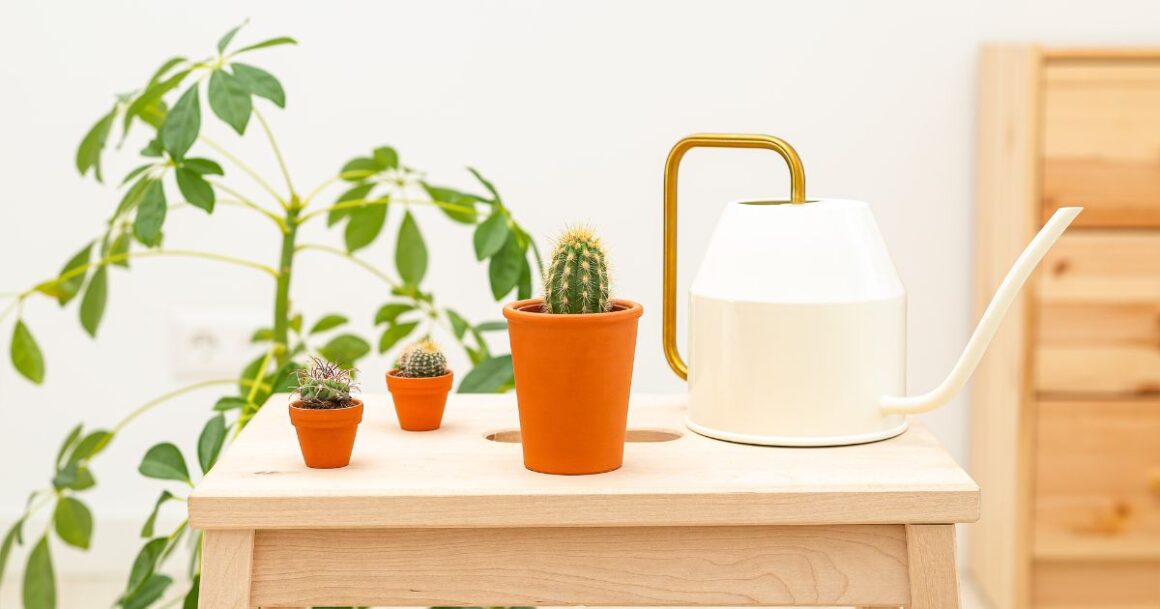
Conclusion: The Best Water for Plants
Ok. In this article, I’ve done my best to help you discover the best water houseplants.
I’ve outlined the different types of water available and the pros and cons of each one.
The bottom line is I think that Trial and error is the best way to know which plants like which kind of water best.
I prefer to use distilled water on my houseplants-however I have found that some of my plant’s growth has slowed, and a few have yellowing leaves.
That said, I have decided to alternate between filtered or bottled or filtered water and distilled water.
I am also considering purchasing this rain catcher to catch rainwater for my plants whenever possible. Although I live in Arizona, we don’t get that much rain. 🙂
I hope this article was helpful. Please let me know your thoughts below, and if you’ve got any plant tips for me, please tell me!
Thanks for stopping by!
Until next time,
XO, Christine

I’ve been keeping it real since 1963. 😊
I’m a child of God, devoted wife, proud mama and grandma, full-time creative, domestic engineer, and passionate self-care enthusiast.
I’m purpose-driven and do my best to live each day with intention—whether shopping for treasures, painting in my art studio, digging in the garden, or cooking up something yummy for my family.
I’m always up for a good chat and love collaborating with fellow creatives and brands.
Let’s connect—don’t be shy!




